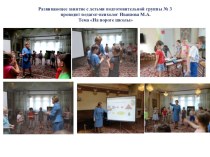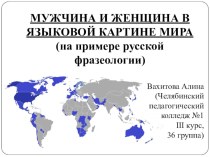- Главная
- Разное
- Бизнес и предпринимательство
- Образование
- Развлечения
- Государство
- Спорт
- Графика
- Культурология
- Еда и кулинария
- Лингвистика
- Религиоведение
- Черчение
- Физкультура
- ИЗО
- Психология
- Социология
- Английский язык
- Астрономия
- Алгебра
- Биология
- География
- Геометрия
- Детские презентации
- Информатика
- История
- Литература
- Маркетинг
- Математика
- Медицина
- Менеджмент
- Музыка
- МХК
- Немецкий язык
- ОБЖ
- Обществознание
- Окружающий мир
- Педагогика
- Русский язык
- Технология
- Физика
- Философия
- Химия
- Шаблоны, картинки для презентаций
- Экология
- Экономика
- Юриспруденция
Что такое findslide.org?
FindSlide.org - это сайт презентаций, докладов, шаблонов в формате PowerPoint.
Обратная связь
Email: Нажмите что бы посмотреть
Презентация на тему Popular art: b-boying (breakdance)
Содержание
Worldwide expansion BrazilIsmael Toledo was one of the first b-boys in Brazil.[28] In 1984, he moved to the United States to study dance.[28] While in the U.S. he discovered breaking and ended up meeting b-boy Crazy Legs who
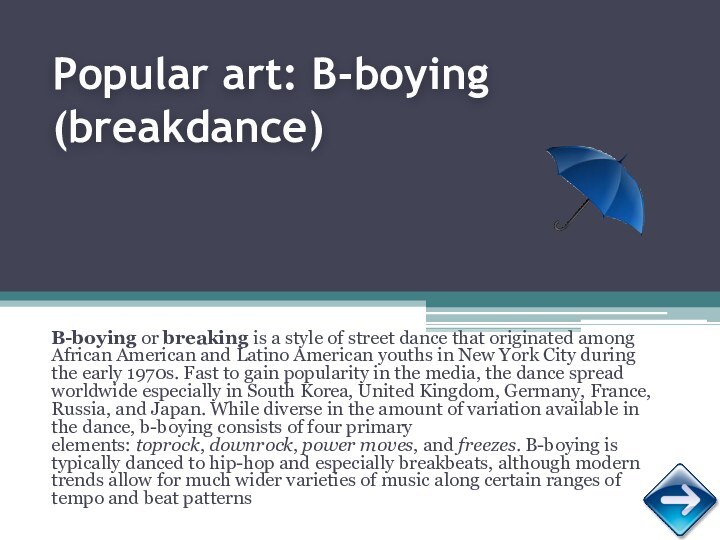
![Popular art: b-boying (breakdance) Worldwide expansion BrazilIsmael Toledo was one of the first b-boys in Brazil.[28] In](/img/tmb/14/1393745/99e07553293be1703d162f21f119fd4e-720x.jpg)
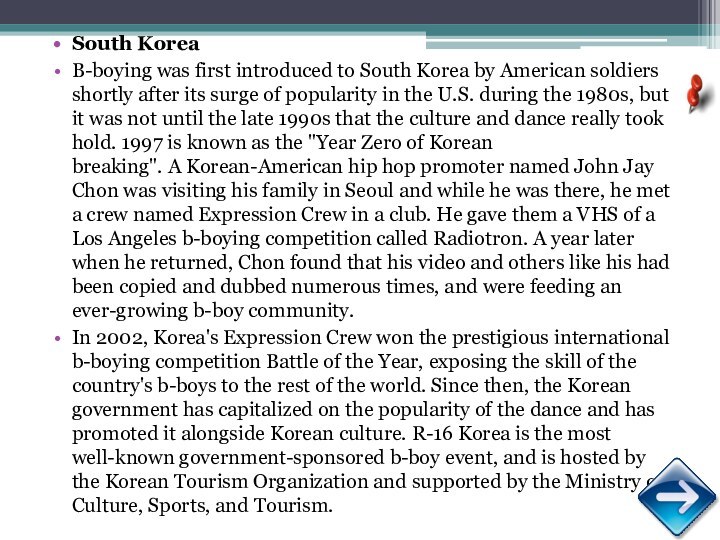
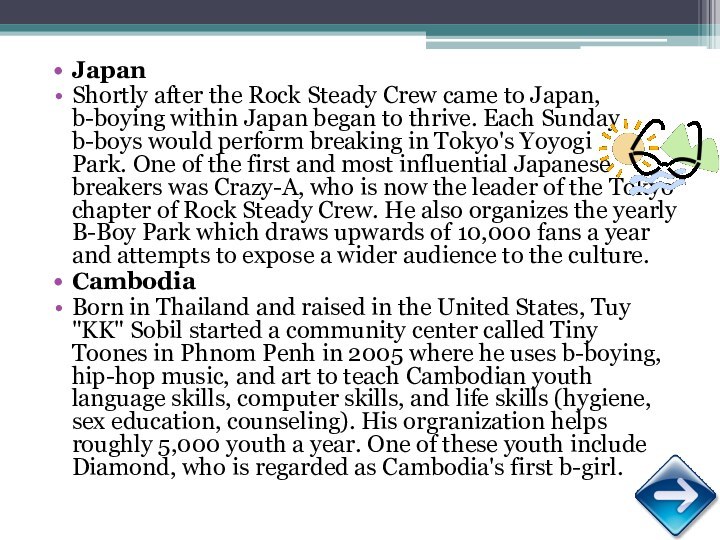
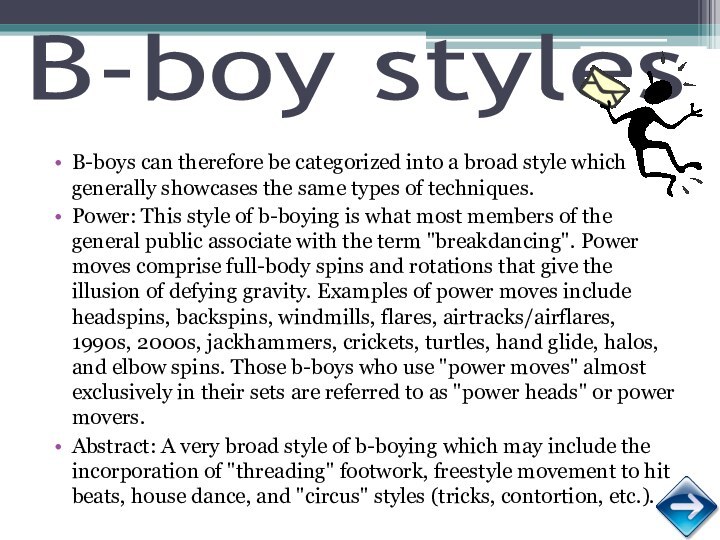
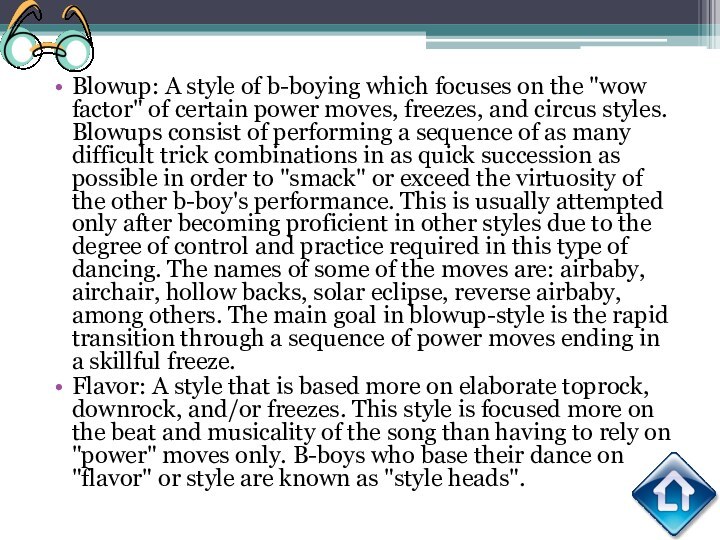
Слайд 3
South Korea
B-boying was first introduced to South Korea
by American soldiers shortly after its surge of popularity
in the U.S. during the 1980s, but it was not until the late 1990s that the culture and dance really took hold. 1997 is known as the "Year Zero of Korean breaking". A Korean-American hip hop promoter named John Jay Chon was visiting his family in Seoul and while he was there, he met a crew named Expression Crew in a club. He gave them a VHS of a Los Angeles b-boying competition called Radiotron. A year later when he returned, Chon found that his video and others like his had been copied and dubbed numerous times, and were feeding an ever-growing b-boy community.In 2002, Korea's Expression Crew won the prestigious international b-boying competition Battle of the Year, exposing the skill of the country's b-boys to the rest of the world. Since then, the Korean government has capitalized on the popularity of the dance and has promoted it alongside Korean culture. R-16 Korea is the most well-known government-sponsored b-boy event, and is hosted by the Korean Tourism Organization and supported by the Ministry of Culture, Sports, and Tourism.
Слайд 4
Japan
Shortly after the Rock Steady Crew came to
Japan, b-boying within Japan began to thrive. Each Sunday
b-boys would perform breaking in Tokyo's Yoyogi Park. One of the first and most influential Japanese breakers was Crazy-A, who is now the leader of the Tokyo chapter of Rock Steady Crew. He also organizes the yearly B-Boy Park which draws upwards of 10,000 fans a year and attempts to expose a wider audience to the culture.Cambodia
Born in Thailand and raised in the United States, Tuy "KK" Sobil started a community center called Tiny Toones in Phnom Penh in 2005 where he uses b-boying, hip-hop music, and art to teach Cambodian youth language skills, computer skills, and life skills (hygiene, sex education, counseling). His orgranization helps roughly 5,000 youth a year. One of these youth include Diamond, who is regarded as Cambodia's first b-girl.
Слайд 5
B-boy styles
B-boys can therefore be categorized into a
broad style which generally showcases the same types of
techniques.Power: This style of b-boying is what most members of the general public associate with the term "breakdancing". Power moves comprise full-body spins and rotations that give the illusion of defying gravity. Examples of power moves include headspins, backspins, windmills, flares, airtracks/airflares, 1990s, 2000s, jackhammers, crickets, turtles, hand glide, halos, and elbow spins. Those b-boys who use "power moves" almost exclusively in their sets are referred to as "power heads" or power movers.
Abstract: A very broad style of b-boying which may include the incorporation of "threading" footwork, freestyle movement to hit beats, house dance, and "circus" styles (tricks, contortion, etc.).





